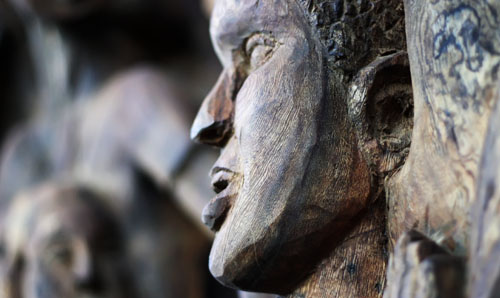 |
| Noriah Mabasa, Unity is power: Let us be united (2010), fig wood, 3200 x 1700 x 1400 mm. |
The first sculptures in a project to establishment a diverse collection of sculptures on our Main Campus were erected in October 2010. Artists were commissioned to create a number of sculptures.
The funds for the project were made available through a grant from the National Lottery Distribution Trust Fund (NLDTF).
This project aims to create an altered environment that provides visible, tangible symbols of change and reconciliation. It also aims to enrich the educational and multicultural experience of staff and students with these areas.
Renowned Venda artist Noriah Mabasa has created a three-metre-high wooden sculpture, “Unity is power: Let us be united”, that was placed outside the new computer laboratory near our UFS Sasol Library. The work consists of several grouped figures celebrating the coming together of many diverse people.
Another artist from Venda, Azwifarwi Ragimana, has been working in collaboration with Gallery 181 in Johannesburg and produced a group of sculptural benches that was placed in the garden behind the Main Building.
Local artists are also involved in this initiative: Jaco Spies, lecturer in our Department of Fine Arts, as well as ceramist Dina Grobler and artists from the Tshiamo Art and Crafts Project are working on a mosaic at a site known as the “philosophers” circle.’
The project will continue in 2011. We can also expect works from leading South Africa artists such as Willem Boshoff and Pat Mautloa.